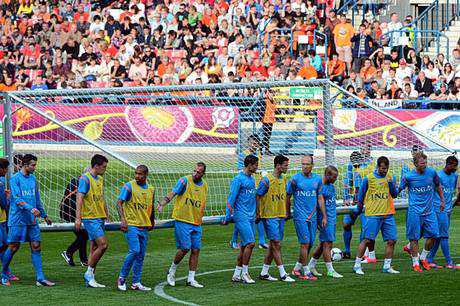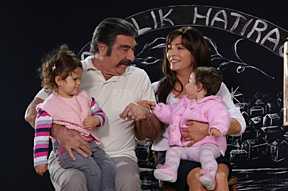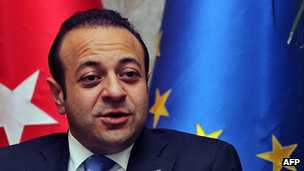More than 1000 Greeks gathered to commemorate for the loss of Istanbul to the Turks more than 550 years ago (!!!)Their leader made a speech in the street in front of 1000s and said that they will never rest `till the day they see Istanbul inside the map of Greece;
Quote: Neo-Nazi Golden Dawn says Istanbul will be Greek
The supporters of Greek neo-Nazi party Golden Dawn, which won nearly 7 percent of the vote in an inconclusive election on May 6, marched on May 30 chanting “Istanbul is Greek and will remain Greek.”Some 1,000 far-right Golden Dawn supporters gathered in Athens city center to protest the 559th anniversary of the capture of Constantinople by the Ottoman Empire and marked the date with a number of events held in the city on May 29.
Golden Dawn`s gypsy leader singing Greek national anthem;
Golden Dawn leader Nikos Mihaliolakos also said, “Istanbul is Greek and will remain Greek,” during the protest. The group chanted the national anthem and made the Nazi salute. June/01/2012 The gypsy neo-nazi speaks; The event ended with a moment of silence with nazi salutes of 1000s, then delusional Greek youth randomly attacked and injured five middle-eastern immigrant they found in the Athens subway in the same night, probably to soothe their anger on the weaklings;
Quote: Passengers of the Athens Piraeus Electric Railways (ISAP) witnessed several attacks against immigrants by supporters of the neo-Nazi party Golden Dawn.On Tuesday night, 30th of May, a group of youngsters attacked a Pakistani immigrant on St Nicolas Electric Railways station deck, causing him multiple injuries. According to eye witnesses, the perpetrators were shouting slogans of the neo-Nazi Golden Dawn party. Police also examines that the perpetrators possibly came from Golden Dawn’s rally commemorating the fall of Constantinople in 1453. Subway passengers also witnessed other violent incidents against immigrants by supporters of the neo-Nazi Golden Dawn, who had participated earlier in their party’s rally in the Athens centre. Golden Dawn denied, in a statement, any involvement in violent incidents [1, 2 & 3]. Two days earlier (28.05.2012), a 33 year-old Bangladeshi immigrant was stabbed and robbed of 130euros in a wagon at Omonoia subway station. According to the Subway workers union, passengers witnessed the perpetrator shouting slogans of the neo-Nazi Golden Dawn party [1]. In another incident in Ilioupoli suburb, strangers attacked and injured an Iranian immigrant with a sharp object. Then, the offenders attacked and robbed a couple that was leaving in another floor of the building [2]. http://www.red-network.eu/?i=red-net…n.items&id=835






